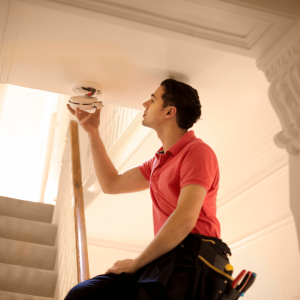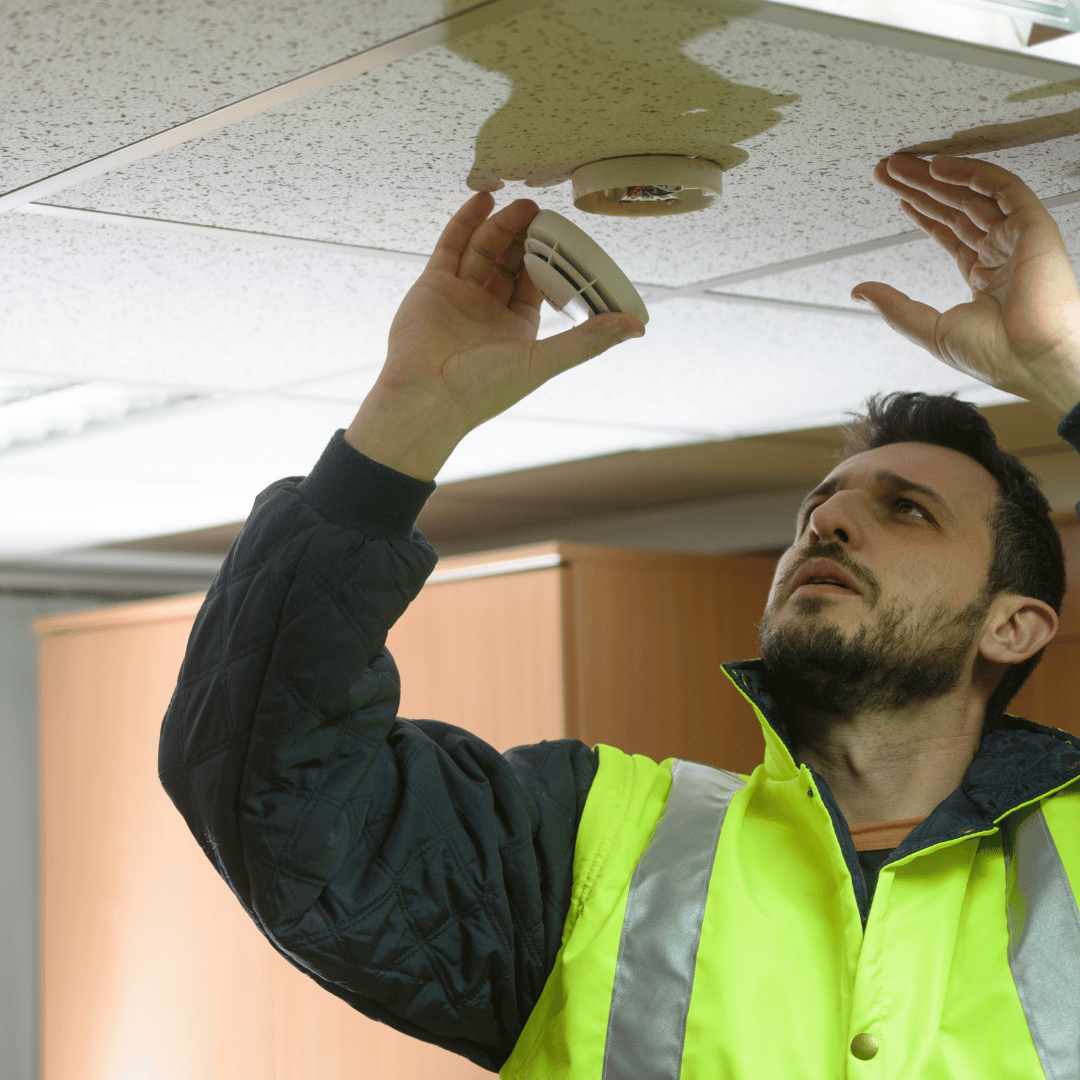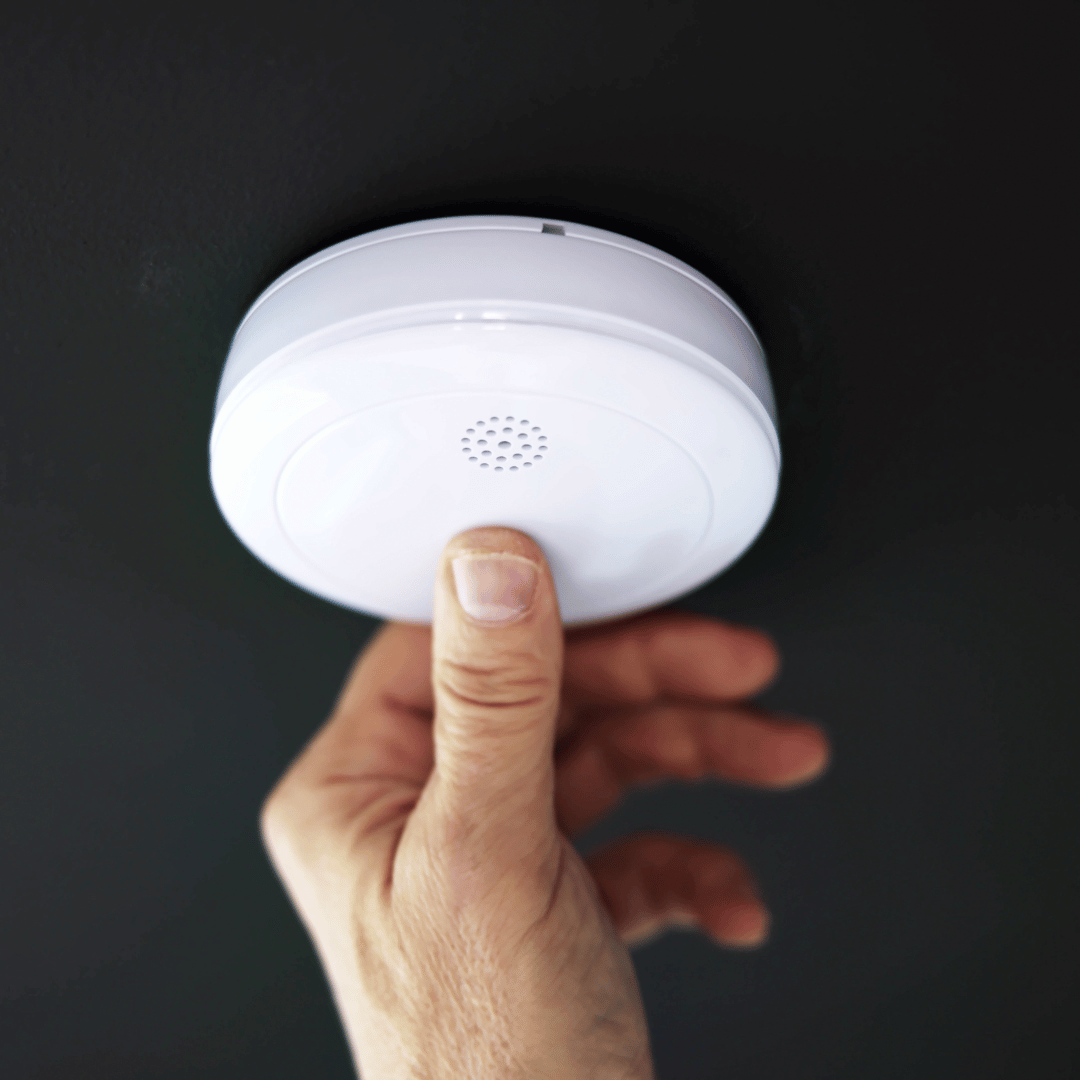
Fire Safety 101: The Importance of Fire Alarms and Smoke Detectors
In an age where home safety is paramount, understanding the difference between fire alarms and smoke detectors is crucial for every homeowner. While both devices play a vital role in protecting your home and loved ones from the devastating effects of fire, they serve distinct purposes and operate in different ways.
Fire alarms are designed to alert you to smoke and heat, often linked to a central monitoring system, while smoke detectors are standalone devices that specifically detect smoke particles. Knowing how each system works and where they should be installed is key to ensuring comprehensive safety within your home.
At HomeSmiles, we believe that preventative home maintenance is essential for safeguarding your family. From ensuring your fire alarm and smoke detector are functioning correctly to offering services like gutter cleaning and dryer vent cleaning, we help you keep your home safe and well-maintained. In this article, we’ll delve deeper into the differences between fire alarms and smoke detectors, answer some common questions, and provide tips for effective fire safety in your home.
Understanding Fire Alarms vs. Smoke Detectors
1. What is a Fire Alarm?
A fire alarm is a comprehensive system designed to detect fire hazards and alert occupants of the danger. Fire alarms can be interconnected, meaning if one alarm goes off, all alarms in the system will activate, ensuring that everyone in the building is alerted, regardless of where they are. Key features include:
- Heat Detection: Fire alarms often have heat sensors that respond to rapid temperature changes.
- Smoke Detection: While they may have smoke detectors integrated, fire alarms primarily focus on overall fire detection.
- Alarm Monitoring: Many fire alarms are linked to a monitoring service that can notify emergency services directly in the event of a fire.
2. What is a Smoke Detector?
Smoke detectors are standalone devices that specifically detect the presence of smoke particles in the air, signaling a potential fire. These devices are typically easier to install and more affordable than fire alarms. Features include:
- Ionization and Photoelectric Sensors: Most smoke detectors use either ionization or photoelectric sensors. Ionization sensors are better at detecting fast-flaming fires, while photoelectric sensors excel at sensing smoldering fires.
- Standalone Units: Smoke detectors can operate independently, which makes them easy to install in various locations throughout your home.
- Battery-Operated or Hardwired: Smoke detectors can be powered by batteries or wired into your home’s electrical system.
3. The Importance of Both Systems
Both fire alarms and smoke detectors are essential components of a comprehensive fire safety strategy in your home. While smoke detectors alert you to the presence of smoke, fire alarms provide a more robust system that can include additional features, such as:
- Automatic Notification: Fire alarms can alert emergency services automatically, saving crucial time during a fire emergency.
- Integration with Other Safety Systems: Fire alarms can often be integrated with other safety and security systems in your home.
Understanding the differences between fire alarms and smoke detectors is essential for effective fire safety in your home. While both play a critical role in alerting you to danger, they function in different ways and are designed for different purposes. In the following sections, we will address common questions about fire alarms and smoke detectors, ensuring you have the knowledge needed to keep your home safe and secure.
Common Questions About Fire Alarms and Smoke Detectors
1. Is a Fire Alarm and Smoke Detector the Same Thing?
No, a fire alarm and a smoke detector are not the same, although they are often used interchangeably. A smoke detector specifically detects smoke, while a fire alarm is a broader system that may include smoke detectors, heat sensors, and the ability to alert emergency services. Understanding the distinction is crucial for effective fire safety measures in your home.
2. Do I Need a Smoke and Fire Detector?
Yes, having both smoke detectors and fire alarms is highly recommended. Smoke detectors serve as the first line of defense by detecting smoke and alerting occupants, while fire alarms provide a more comprehensive fire safety system that can include interconnectivity with other alarms and automatic notifications to emergency services. Together, they ensure maximum protection against fire hazards.
3. Why Did My Fire Alarm Randomly Go Off in the Middle of the Night?
There are several reasons why a fire alarm might go off unexpectedly, including:
- Cooking Smoke: Smoke from cooking can trigger alarms, especially if they are placed near kitchens.
- Low Battery: A low battery can cause the alarm to malfunction and emit false alarms.
- Dust or Debris: Accumulation of dust can interfere with the sensors, leading to random activations.
- Humidity or Steam: Excessive moisture in the air can trigger the alarm, particularly in bathrooms or near laundry rooms.
To mitigate these issues, regular cleaning and maintenance of your fire alarm system is essential.
4. How to Stop a Smoke Detector from Beeping?
If your smoke detector is beeping, it typically indicates that it needs attention. Here’s how to stop the beeping:
- Check the Battery: Replace the battery if it’s low.
- Reset the Alarm: Most smoke detectors have a reset button. Press and hold it to reset the device.
- Clean the Detector: Use a vacuum or soft brush to remove dust and debris from the detector.
- Ensure Proper Installation: If the smoke detector continues to beep, it might not be installed correctly or may require replacement.
5. Why is My Smoke Alarm Chirping if It’s Hard-Wired?
A chirping sound from a hard-wired smoke alarm often indicates a problem with the unit, such as:
- Battery Backup: Even hard-wired alarms usually have a backup battery that can become depleted. Replace the backup battery to stop the chirping.
- Electrical Issues: If there’s a problem with the wiring, it may cause the alarm to chirp. In this case, consult a professional electrician.
- End of Life: Smoke alarms have a limited lifespan, typically around 10 years. If your unit is old, consider replacing it.
6. Why Does My Smoke Detector Keep Chirping Even After I Change the Battery?
If your smoke detector continues to chirp after changing the battery, it could be due to:
- Incorrect Installation: Ensure the battery is installed properly, with the correct polarity.
- Residual Charge: Sometimes, a smoke detector may retain a charge for a short period after a battery change. Give it a moment to reset.
- Faulty Unit: If none of the above solutions work, the smoke detector may be faulty and require replacement.
Understanding how to maintain and troubleshoot your fire alarms and smoke detectors is essential for ensuring safety in your home. By addressing these common questions and potential issues, you can enhance your home’s fire safety measures. In the following sections, we will explore further considerations for maintaining these critical devices in your home.
The Importance of Regular Maintenance
Regular maintenance of fire alarms and smoke detectors is crucial for ensuring they function correctly when needed. Neglecting these devices can lead to false alarms, missed alerts, and potential safety hazards. Here are some key maintenance tips:
1. Test Your Alarms Monthly
Testing your smoke detectors and fire alarms monthly is essential. Most units have a test button that you can press to check if the alarm sounds. If the alarm does not sound, replace the battery or the entire unit if it is hard-wired.
2. Replace Batteries Annually
Even if your smoke detector is hard-wired, it typically has a backup battery. Replace these batteries at least once a year to ensure they are always operational. A good practice is to do this when you change your clocks for daylight saving time.
3. Clean the Units
Dust and debris can accumulate in smoke detectors, affecting their ability to detect smoke properly. Use a vacuum cleaner or a soft brush to clean the exterior of the detectors and remove any buildup inside the unit. This maintenance should be done at least twice a year.
4. Check Expiration Dates
Smoke detectors have a lifespan of about 10 years. Check the manufacture date on your detectors, and replace any units that are nearing the end of their life. If you’re unsure, consider replacing older units even if they seem to be functioning well.
5. Ensure Proper Placement
Ensure your smoke detectors and fire alarms are correctly placed throughout your home. They should be installed:
- On every level of your home, including the basement.
- Inside each sleeping area and outside each separate sleeping area.
- At least 10 feet away from cooking appliances to prevent false alarms.
6. Keep Documentation
Keep a record of when you last tested or replaced the batteries and when you last cleaned the units. This documentation will help you stay on top of maintenance tasks and ensure that your devices are always in good working condition.
7. Seek Professional Help When Needed
If you experience persistent issues with your smoke detectors or fire alarms, or if you are unsure about how to maintain them, don’t hesitate to reach out to a professional. They can provide guidance on installation, maintenance, and any necessary repairs.
Regular maintenance of your fire alarms and smoke detectors is essential for protecting your home and loved ones. By following these guidelines, you can ensure your devices remain functional and effective in providing early warnings in case of a fire. In the next section, we’ll discuss the best practices for installing fire alarms and smoke detectors in your home.
Best Practices for Installation
Proper installation of fire alarms and smoke detectors is crucial for maximizing their effectiveness. Here are some best practices to follow when installing these life-saving devices in your home:
1. Choose the Right Type of Detector
Understanding the different types of smoke detectors available can help you choose the right one for your needs:
- Ionization Smoke Detectors: These are sensitive to fast-flaming fires, such as those caused by paper or flammable liquids.
- Photoelectric Smoke Detectors: These work best for smoldering fires, like those caused by burning upholstery or bedding.
- Combination Detectors: These units have both ionization and photoelectric sensors, providing comprehensive protection against all types of fires.
2. Follow Manufacturer Guidelines
Always adhere to the manufacturer’s instructions regarding installation. This includes specific recommendations for placement, height, and distance from walls or appliances. These guidelines are designed to optimize the detector’s performance.
3. Install at the Right Height
For best results, smoke detectors should be installed high on walls or ceilings, as smoke rises. If installing on a ceiling, place the detector at least 4 inches away from any wall. If installing on a wall, it should be 4 to 12 inches from the ceiling.
4. Ensure Proper Coverage
Make sure to install smoke detectors in key areas, including:
- Every Bedroom: Install a smoke detector inside each bedroom to alert sleeping occupants.
- Hallways: Place detectors in hallways that lead to bedrooms and other sleeping areas.
- Living Areas: Install units in common areas like the living room, family room, or basement.
- Near Kitchens: Place smoke detectors near but not directly in kitchens to minimize false alarms.
5. Consider Hardwired vs. Battery-Powered
- Hardwired Detectors: These are connected to your home’s electrical system, providing constant power. They often have a battery backup, ensuring they remain functional during power outages.
- Battery-Powered Detectors: While easier to install, these require regular battery replacements. Consider using lithium batteries for longer life.
6. Create a Testing Schedule
Once installed, create a testing schedule for your smoke detectors. Testing them monthly ensures they function correctly. You might want to coordinate testing with other home maintenance tasks, like changing air filters or replacing HVAC filters.
7. Educate Household Members
Ensure that everyone in your household understands the purpose of the smoke detectors and knows what to do when they sound. Conduct fire drills and establish a family escape plan, so everyone knows how to exit the home safely in case of an emergency.
8. Seek Professional Installation When Necessary
If you’re unsure about installing your fire alarms or smoke detectors, consider hiring a professional. This ensures that the devices are correctly installed and placed for maximum effectiveness. Professional installation can also provide peace of mind, knowing that your home is as safe as possible.
By following these best practices for installation, you can ensure that your fire alarms and smoke detectors are optimally positioned to protect your home and loved ones. In the next section, we will discuss the differences between fire alarms and smoke detectors, helping you understand which devices are essential for your safety.
Understanding the Differences Between Fire Alarms and Smoke Detectors
While the terms “fire alarm” and “smoke detector” are often used interchangeably, they refer to different devices with distinct functions. Understanding these differences is crucial for effective fire safety in your home. Here’s a breakdown of each:
1. Smoke Detectors
Function: Smoke detectors are standalone devices that sense smoke in the air, triggering an alarm when smoke particles are detected. They are primarily designed to alert occupants to the presence of smoke and potential fire hazards.
Types:
- Ionization Smoke Detectors: Best for detecting fast-flaming fires, these detectors use radioactive material to ionize the air and detect changes caused by smoke particles.
- Photoelectric Smoke Detectors: These work by using a light beam to detect smoke. When smoke enters the chamber, it scatters the light, triggering the alarm. They are more effective at detecting smoldering fires.
Installation: Smoke detectors can be installed in various locations, such as bedrooms, hallways, and living areas. It’s essential to install them high up, as smoke rises.
2. Fire Alarms
Function: Fire alarms are more comprehensive systems that may include smoke detectors as part of a larger network. They not only alert occupants but may also connect to a monitoring service or local fire department for rapid response.
Types:
- Conventional Fire Alarms: These systems usually consist of a series of interconnected smoke detectors that signal an alarm if smoke is detected in any of the units.
- Addressable Fire Alarms: These advanced systems can identify the specific location of the smoke detector that triggered the alarm, allowing for a faster response.
Installation: Fire alarms require professional installation, as they often involve complex wiring and integration with other safety systems. They are typically used in larger residential buildings, commercial spaces, and multifamily dwellings.
3. Key Differences
4. Why Both Are Important
Both smoke detectors and fire alarms play crucial roles in fire safety:
- Smoke Detectors: Essential for early detection in individual rooms, providing immediate alerts to occupants and allowing them to escape in time.
- Fire Alarms: Vital for larger spaces where multiple detectors are needed for comprehensive monitoring, ensuring rapid response from emergency services.
5. Regulatory Requirements
In many areas, building codes require a combination of smoke detectors and fire alarm systems, especially in commercial buildings and multi-family residences. It’s essential to check local regulations to ensure your home is compliant with fire safety standards.
Understanding the differences between smoke detectors and fire alarms is crucial for effective fire safety in your home. In the next section, we will explore the importance of regular maintenance for these devices, ensuring they function properly when needed most.
In summary, understanding the distinction between fire alarms and smoke detectors is vital for maintaining a safe living environment. While both devices play crucial roles in fire safety, they serve different functions and are essential for comprehensive protection. Smoke detectors alert occupants to potential fire hazards, while fire alarms provide a more extensive monitoring system that can notify emergency services for rapid response.
To ensure your home remains safe from fire risks, it’s essential to regularly test and maintain your smoke detectors and fire alarms. Replacing batteries as needed, cleaning the devices, and ensuring proper installation can significantly enhance your safety.
At HomeSmiles, we understand the importance of preventative home maintenance, including fire safety measures. Our extensive 18-point inspection covers all your home maintenance needs, ensuring that all those “honey-do” items on your list are taken care of, helping you avoid costly repairs down the line.
Take action today! Ensure your home is equipped with the right fire safety devices and schedule a maintenance check with us to keep your home safe and sound. Contact HomeSmiles for a thorough home safety assessment!
- Protecting Your Property: Why the Right Cleaning Method Makes All the Difference
- The #1 Thing That’s Dulling Your Curb Appeal (And How to Fix It)
- How Maintenance Bundles Provide Peace of Mind for Busy Small Business Owners and Facility Managers
- Essential vs. Complete Home Packages: Choosing the Right Preventive Care for Your Property
- How a Simplified Service Model Benefits Both Homeowners and Franchisees Alike


